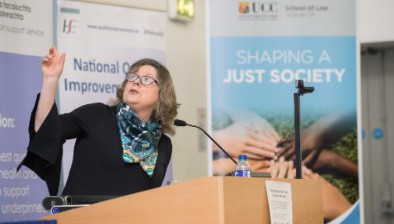High Court: Next friend must bear costs of litigation of woman who was found to lack capacity mid-trial

The High Court has rejected an application by a woman’s legal representatives that her estate should bear the costs of unsuccessful litigation after she was found to lack capacity to give instructions during trial. The lawyers stated that they could not find a next friend who was willing to act unless they were not liable for any costs orders from the 21-day trial.

About this case:
- Citation:[2022] IEHC 381
- Judgment:
- Court:High Court
- Judge:Ms Justice Emily Egan
Delivering judgment in the case, Ms Justice Emily Egan held that it was not appropriate to depart from the usual rule that a next friend must bear the costs of unsuccessful litigation. It was held that there was no reason to distinguish between a next friend who acted prior to the commencement of proceedings and a next friend who was required after proceedings began.
Further, the court held that, since the woman may be taken into wardship, she would be denied certain wardship protections if an order was made that the woman was liable for the costs rather than the next friend.
Background
The woman (CD) was 77 years old and had brought proceedings against the respondent, who was the executor of the estate of HT. The proceedings contended that CD had been in a cohabiting in a committed relationship with HT for 33 years. As such, she claimed provision from the estate.
The trial commenced and took 21 days, most of which was taken up with the examination and cross-examination of CD. It transpired that both the respondent and CD’s legal advisers became concerned about her capacity during the trial. The case was adjourned to allow CD to be assessed.
A consultant forensic psychiatrist provided an opinion on the applicant’s functional capacity to give instructions and participate in litigation. It was opined that CD lacked such capacity. As such, the applicant’s legal representatives determined that it was necessary to appoint a next friend on CD’s behalf to continue the litigation.
However, although certain people were identified, no one was willing to act as next friend due to the personal costs exposure of a three-week trial that was not yet concluded. Subsequently, the applicant’s legal representatives brought an application seeking an order that any costs liability which might arise would be discharged by the applicant personally rather than by any potential next friend. This was described as a pre-emptive costs order.
Several issues were raised by the respondent in the application. It was submitted that the court did not have jurisdiction to make such a pre-emptive costs order under either the Legal Services Regulation Act 2015 or the Rules of Court. Further, it was said that the appropriate course of action would be to admit CD into wardship and that a costs order could not be made before the litigation had concluded. Finally, even if the court could make the order, it was said that the court should exercise its discretion to refuse the order.
High Court
Ms Justice Egan began by noting her serious concern that the present application was made without proper instructions from CD, since it was accepted that she lacked capacity.
The court considered the relevant provisions of the LSR Act 2015 and Order 99 RSC and stated that there were difficulties with making a pre-emptive costs order as requested by the applicant’s representatives. In particular, the provisions strongly suggested that the litigation (or any module) must have already been conducted before the court could make a ruling on costs. Since costs orders were dependent on the conduct of litigation, it was hard to see how the court could justly adjudicate on the costs issue at this point, the court said.
The court was hesitant to accept the applicant’s submission that there was an inherent jurisdiction to make a pre-emptive costs order. Even if the jurisdiction existed, it should be used sparingly “in the most exceptional circumstances of urgency and necessity without hearing representations on behalf of the applicant”.
The court went on to consider the next friend jurisdiction generally, noting that a next friend would normally assume liability for costs. This was contrasted with guardians ad litem, who were protected from costs in defending proceedings taken against persons of unsound mind.
The court held that there was not “any particular reason to distinguish between a next friend who agrees to act prior to the commencement of the proceedings from a next friend who agrees to act because of supervening unsoundness of mind after their commencement”. A next friend who is joined during the currency of proceedings assumed “precisely the same role” regarding the conduct of the litigation, the court said.
Further, the court did not accept that the proceedings would lapse if the pre-emptive order was not made, noting that the proceedings could be progressed by CD’s committee if she was taken into wardship or under the nuanced scheme for the Assisted Decision Making (Capacity) Act 2015.
Additionally, the same difficulties would have arisen if the applicant lacked capacity prior to proceedings, the court said. The case law demonstrated that an order for the applicant to indemnify the next friend was “entirely exceptional”, and no authority was cited where costs were awarded personally against the plaintiff rather than the next friend on a pre-emptive basis or otherwise (see McHugh v. Phoenix Laundry Ltd [1966] IR 60; Sheridan v. McCartan [1968] IR 7).
Finally, the court considered whether the costs order was necessary to vindicate CD’s access to justice. The court was not prepared to assume that a next friend would act irresponsibly if they were free from liability as to costs. However, it was noted that the order as sought would mean that the applicant would lose control of the proceedings but her assets would remain fully at risk from an adverse costs order.
Ms Justice Egan held that, while the court was asked to assume that CD was of unsound mind, this did not mean that CD would be taken into wardship. In this regard, the medical opinion only extended to CD’s capacity to make decisions relating to the litigation, and it was possible to deal with wardship in a “nuanced or targeted application”. It was also pointed out that the imminent commencement of the ACDA 2015 could allow CD to be assisted in making decisions in the litigation.
The effect of the order would be to deny CD the protections of the wardship or assisted decision-making regimes, as well as the protections usually afforded to persons of unsound mind, the court said. As such, the court declined to make “an order that would so radically impact upon the applicant’s interests” particularly where she did not have the benefit of separate legal representation.
Conclusion
The court refused to make the pre-emptive costs order.
C.D. v. B.B. [2022] IEHC 381











